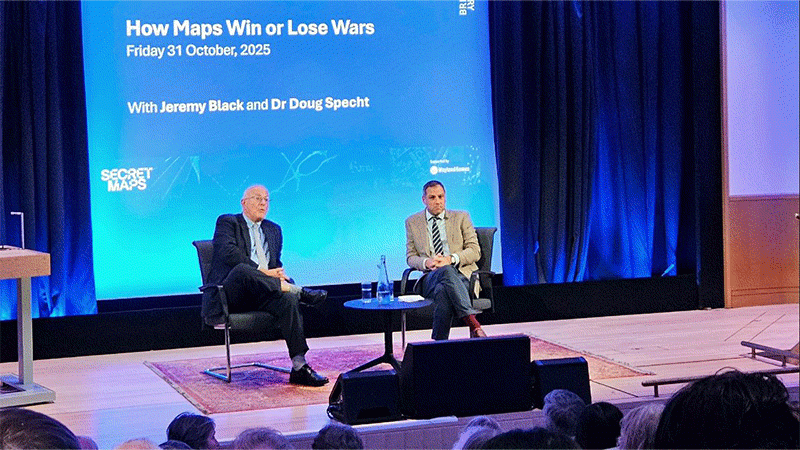Dr Doug Specht, Reader in Cultural Geography and Communication and Head of the School of Media and Communication at the University of Westminster, recently chaired a panel at the British Library, drawing on his work on cartography and war and exploring the items featured in the Secret Maps exhibition currently taking place at the library. He joined award-winning author and renowned military historian Professor Jeremy Black to analyse maps designed for secrecy and reflect on the enduring use of cartography as a strategic and political tool.

The panel took place on 31 October as part of the library’s How Maps Win or Lose series, a programme of talks and discussions hosted by the British Library’s Knowledge Centre. The series explores and interprets the British Library's Secret Maps exhibition, which runs from 24 October to 18 January and uncovers hidden stories of maps used for espionage, military deception and intrigue.
Dr Specht spoke to Professor Black about his expertise and both offered attendees historical insights, reaffirming the persistent relevance of maps, not just as sources of information, but instruments of power. They explained that maps can have the power to shape, sometimes decisively, the outcomes of wars and the fates of those involved.
Highlights included Professor Black sharing memorable historical examples where concealed or restricted maps played pivotal roles, from Wellington’s campaigns to allied operations in World War Two, helping audiences understand the implications of withheld geographic knowledge. They also explored how fake and misleading maps have been used to destabilise enemies, alter perceptions and impact the psychological dimension of warfare.
The shift from hand-drawn charts to satellite and digital mapping and its effects on the nature of secrecy was also examined. The pair reflected on whether technological advances have democratised access or merely shifted the boundaries of what remains secret. Deliberation then turned to the sometimes fraught relationship between official military maps and lived experiences on the ground, considering consequences when field realities diverge from headquarters’ cartographic representations.
Dr Specht and Professor Black also addressed the ethical challenges around map publication, such as the responsibilities of military cartographers not to expose communities, refugees or strategic infrastructure through the careless release of sensitive data.
About the panel Dr Specht said: “It was a genuine pleasure to be in conversation with Jeremy Black. His insights into the history and significance of maps, especially in the context of warfare, really captivated the audience and brought a new depth to our understanding. Sharing this conversation with such an esteemed historian, surrounded by the extraordinary collections of the British Library, made the Secret Maps exhibition all the more special.”
The panel directly contributes to the United Nations Sustainable Development Goals (SDG) 4: Quality Education, 16: Peace, Justice and Strong Institutions and 17: Partnerships for the Goals. Since 2019, the University of Westminster has used the SDGs holistically to frame strategic decisions to help students and colleagues fulfil their potential and contribute to a more sustainable, equitable and healthier society.
Learn more about the School of Media and Communication at the University of Westminster.


